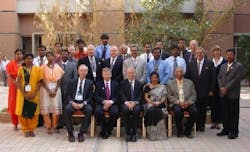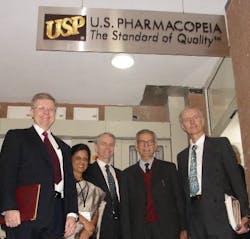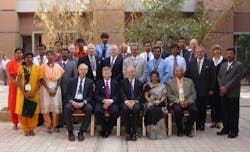In February, USP started up its first operations outside the U.S., when it opened a new business office and testing laboratories in Hyderabad, Andhra Pradesh. Heading up the new operations is Ms. Kumud Sampath, former president of AstraZeneca India (Photo 1 below). The laboratory will feature state of the art instrumentation, including HPLC and gas chromatography, and will employ 33 people (Photo 2 below).
USP Indias first project will be a verification program that will focus on assuring the quality of dietary supplements and ingredients. Within the next six months, USP plans to extend this program to verify the quality of APIs and excipients.
USP saw a tremendous need for more testing capability in India. Demand for reference standards in India has increased at a phenomenal rate almost doubling within the last few years, said John Fowler, USPs chief business officer.
We had been working in India for many years, with constituencies that use standards, such as scientists, regulators, government officials and regulators. We wanted to be much closer to users of those standards, said Fowler. India is a great and growing market, and half of the generic drugs today use Indian-manufactured APIS. There is a huge need for standards, which are vitally important to protecting consumers, Fowler said.
At this point, non-U.S.users have no way of knowing when materials are shipped, whether or not they meet USP standards without verification. Combating counterfeit drugs is a critical effort, and weve been warmly received by the Indian government, Fowler says. Our operations in India will help ensure the safety of Indias domestic drug supply as well as what is shipped outside of India.
The new site will focus on evaluating reference standards, on collaborative testing and establishing references standards used by industry throughout the world, said Srini Srinavasan, Vice President of verification for the new lab, who helped on the ground in India, to bring the new lab online. Everyone will have to use the same standards, Srinavasan says. Considering that over 650 bulk ingredients used throughout the world are made in India, virtually any drug listed in the compendium is made here.
The new Indian operations will focus on antiretroviral drugs, as well as treatments for such negledted diseases as TB and malaria that still afflict the subcontinent, Fowler said.
Will USP open other facilities abroad in the future? Fowler doesnt rule that out. He says the organization is looking at China, Latin America and other areas to determine whether it should have a presence there.


